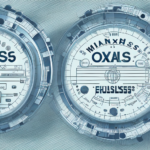Ohaus D51XW vs PEC Scales: Comprehensive 2024 Comparison
When selecting weighing scales for your business, the market offers a myriad of options tailored to various needs. Two prominent choices are the Ohaus D51XW and the PEC Scale. This article provides a comprehensive comparison of these two scales, examining their key features, pros and cons, pricing, accuracy, durability, ease of use, and customer feedback. By the end of this guide, you'll be equipped to determine which scale aligns best with your business requirements.
Introduction to Ohaus D51XW and PEC Scales
The Ohaus D51XW and the PEC Scale are both highly regarded in the weighing scale industry. Ohaus, a reputable brand with over a century in manufacturing precision scales, offers the D51XW as one of its flagship models, renowned for its accuracy and durability (Ohaus About Us).
PEC, emerging more recently, has quickly gained traction by providing a diverse range of scales that emphasize reliability and affordability. Both scales serve various industries, including food processing, pharmaceuticals, and manufacturing, but they cater to different operational needs.
The Ohaus D51XW boasts a large, easy-to-read display and can handle weights up to 50 pounds with an accuracy of 0.001 pounds. Its built-in rechargeable battery ensures functionality even in areas without immediate power sources. Conversely, the PEC Scale is celebrated for its portability and user-friendly design, supporting weights up to 20 pounds with the same high accuracy. Its backlit display enhances readability in low-light environments.
Key Features
Ohaus D51XW Features
- Durability: IP65 rated, making it dust-tight and resistant to low-pressure water jets.
- Display: High-contrast LCD for clear visibility in various lighting conditions.
- Power Options: Compatible with both AC and DC power sources.
- Weighing Modes: Multiple modes including parts counting and checkweighing.
- Overload Protection: Prevents damage from excessive weights.
- Weighing Pan: Stainless steel construction for easy cleaning and corrosion resistance.
- Energy Efficiency: Programmable auto-off function to conserve battery life.
The Ohaus D51XW is engineered for industrial environments, ensuring longevity and consistent performance under demanding conditions.
PEC Scale Features
- Portability: Compact and lightweight design for easy transportation.
- Memory Function: 99-item memory for storing and recalling frequently weighed items.
- Dual-Display: Simultaneously shows weight readings and unit prices.
- Tare Function: Allows for accurate weighing by excluding container weights.
- Power Source: Battery-operated for use in areas without electricity.
The PEC Scale is ideal for businesses requiring mobility and flexibility, such as farmers, fishermen, and small retail operations.
Pros and Cons
Ohaus D51XW Scale
Pros:
- Highly accurate with readability up to 0.5 grams.
- Durable construction suitable for harsh industrial environments.
- Versatile applications across various industries.
- Large, easy-to-read display with multiple power options.
- Advanced features like overload protection and multiple weighing modes.
Cons:
- Higher price point ($500-$600), which may be restrictive for small businesses.
- Requires regular calibration to maintain accuracy, potentially increasing operational costs.
Despite its higher cost, the Ohaus D51XW offers unparalleled precision and robustness, making it a valuable investment for businesses with substantial weighing needs.
PEC Scale
Pros:
- Affordable pricing, ranging from $50-$100.
- Lightweight and compact for easy transport and storage.
- User-friendly features such as dual-display and memory function.
- Battery-powered, providing flexibility in power sourcing.
Cons:
- Lower weight capacity (up to 20 pounds) may limit its use in heavier applications.
- Potentially less durable under intensive use compared to higher-end models.
- Accuracy of up to 1 gram may not suffice for precision-required tasks.
The PEC Scale presents an excellent value for money, particularly for small businesses or operations where portability is crucial. However, its limitations in durability and precision should be considered based on business needs.
Comparative Analysis
Price Comparison
The Ohaus D51XW is positioned as a high-end scale, priced between $500-$600. This investment reflects its advanced features, higher weight capacity, and superior accuracy. In contrast, the PEC Scale is a budget-friendly option, with prices ranging from $50-$100, making it accessible for startups and small businesses.
While the Ohaus model offers enhanced capabilities, the PEC Scale delivers essential functionalities at a fraction of the cost. Businesses must evaluate their weighing requirements and budget constraints to make an informed decision.
Accuracy Comparison
Accuracy is a critical factor in weighing scales. The Ohaus D51XW excels with a readability of up to 0.5 grams, making it suitable for applications demanding high precision, such as laboratory measurements and detailed inventory management. According to a study by the National Institutes of Health, precise measurements can significantly reduce errors in quality control processes.
On the other hand, the PEC Scale offers a readability of up to 1 gram, which is adequate for general weighing tasks but may fall short for precision-centric operations. For businesses where slight variances can impact outcomes, the Ohaus D51XW's superior accuracy justifies its higher cost.
Ultimately, the choice hinges on the specific accuracy requirements of your operations. Incorporating accurate scales can enhance operational efficiency and reduce errors, contributing to better business outcomes.
Durability Comparison
Durability is paramount, especially in environments with heavy usage or exposure to harsh conditions. The Ohaus D51XW stands out with its IP65 rating, ensuring it is dust-tight and resistant to water jets. Its stainless steel weighing pan offers exceptional corrosion resistance, suitable for industries like manufacturing and food processing (Ohaus Product Details).
In contrast, the PEC Scale is built for portability and may not endure the same level of industrial stress. While it is sufficiently durable for light to moderate use, environments with high moisture or chemical exposure could compromise its longevity.
Additionally, the Ohaus D51XW comes with a two-year warranty, providing assurance against defects and malfunctions. The PEC Scale may offer shorter warranty periods, which is an important consideration for businesses that depend heavily on their weighing equipment.
Ease of Use Comparison
Both the Ohaus D51XW and the PEC Scale prioritize user-friendliness, but they achieve it differently. The Ohaus model features a high-contrast LCD display that ensures readability in various lighting conditions, along with intuitive controls for different weighing modes.
The PEC Scale enhances ease of use with its dual-display functionality, allowing users to monitor weight and unit price simultaneously. Its compact design simplifies transport and setup, making it ideal for dynamic environments where the scale needs to be frequently moved.
Ultimately, the ease of use will depend on the specific operational context of your business. User-friendly interfaces can reduce training time and minimize errors, contributing to smoother operations.
Customer Reviews
Ohaus D51XW Scale
Customers commend the Ohaus D51XW for its exceptional accuracy, robust build quality, and versatility across different applications. Positive feedback often highlights its reliability in demanding industrial settings and the clarity of its display. Users also appreciate the variety of weighing modes, which enhance its adaptability for various tasks.
However, some users note the higher cost as a potential drawback, especially for smaller businesses with limited budgets. Additionally, the necessity for regular calibration has been mentioned as a maintenance requirement that adds to ongoing expenses.
PEC Scale
The PEC Scale receives praise for its affordability and portability, making it a favorite among small business owners and those needing a mobile weighing solution. Customers value its ease of use and practical features like the tare function and memory storage.
Nevertheless, some users have expressed concerns about its durability and precision, indicating that the scale may not perform optimally under heavy usage or in environments requiring high accuracy. These feedback points suggest that while the PEC Scale is suitable for general purposes, it may not meet the standards of more demanding applications.
Which Scale is Best for Your Business?
Choosing between the Ohaus D51XW and the PEC Scale depends on your business's specific needs and budget:
- Ohaus D51XW: Ideal for large businesses that require high precision, robust durability, and versatile functionality. Suitable for industries like manufacturing, pharmaceuticals, and food processing where accuracy and reliability are paramount.
- PEC Scale: Perfect for small businesses, startups, or operations that prioritize portability and cost-effectiveness. Suitable for sectors like retail, agriculture, and services where flexibility and affordability are key.
Assess your operational requirements, budget constraints, and the scale's intended usage to make an informed decision that will enhance your business's efficiency and accuracy.
Conclusion: Final Verdict on Ohaus D51XW vs PEC Scales
Both the Ohaus D51XW and the PEC Scale present compelling options for businesses seeking reliable weighing solutions. The Ohaus D51XW excels in accuracy, durability, and versatility, making it suitable for demanding industrial environments despite its higher price point. Conversely, the PEC Scale offers excellent value for money with its affordability and portability, catering well to small businesses and those requiring flexible weighing solutions.
Your choice should align with your business's specific needs, weighing the importance of precision and durability against budget and portability. By carefully considering these factors, you can select a scale that not only meets your current requirements but also supports your business's growth and operational efficiency.






















